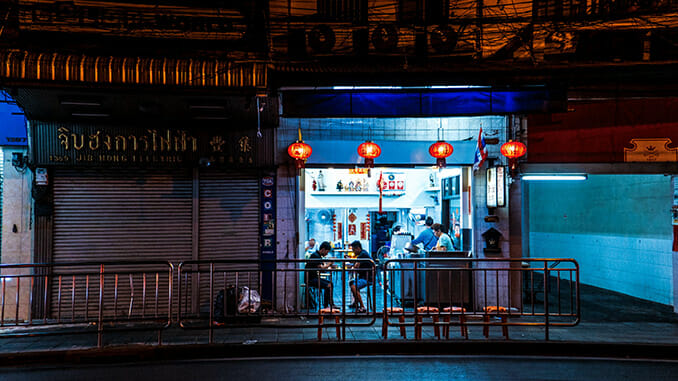A Lovely Rumination on Loneliness, Days Will Linger with You
Images via Myranda Dapolito (CMPR)
Early in Tsai Ming-liang’s Days—in the second or third shot, in fact, so something like 10-15 minutes into the film—we’re left to ponder Lee Kang-sheng’s third nipple. In a soaking pool, at a bathhouse maybe or somewhere health-care-related, Kang (when he has a name, Tsai often refers to Kang-sheng’s characters as “Kang” or “Hsiao-kang”) silently, nakedly floats, the camera mostly consumed with his torso, our view of that third nipple practically sharpened by the pane of still water between us and his skin. He dozes, not for the last time. The water in which Kang is submerged reflects the essences of what lies outside of frame—reflecting his vulnerability by intimating much more vulnerable flesh just below our view—as much as it reminds us of Days’ opening shot, where Kang sits in a chair staring out a window, the window between us and Kang, watching a rainstorm pick up, the shadows of tropical trees shaking in the drop-littered glass. (Water too, usually flooding urban spaces, makes for a constant motif in Tsai’s films.) The longer we watch him, the more we feel as if he’s outside in the storm, or the storm is inside the room with him, watching itself rage. And the longer we watch this nipple, consider it and everything that lends it context, the more we’re encouraged to think of it within the world of Tsai’s previous feature films (Days his 11th). And the more we reminisce about all the films in which that third nipple was there, under Lee’s shirt or lost to the sumptuous grain of 35mm film, the more we see all of Tsai’s work as a slipstream, in which the “same” people live scores of alternate but intertwined lives, each film a brief but meaningful glimpse into how these lives meet—or don’t meet—skeins in the broad tapestry of loneliness and alienation that increasingly consumes us. The third nipple was there all along.
Kang, we intuit, is sick—there might be something going on with his neck. One shot shows him uncomfortably craning his head, similar to the mysterious malady a much younger Hsiao-kang experiences in Tsai’s The River, from 1997. He goes to acupuncture, gets testy with the specialist, seems to grow more and more miserable, then walks listlessly through the crowded streets of Bangkok—I think—in a brace, clutching at the side of his noggin while Tsai and cinematographer/editor Chang Jong-yuan (with whom he’s worked since 2015’s No No Sleep) follow closely, shreds of vérité showing up in the faces of real passersby who sense something contrived may be happening. There is something contrived happening, after all.
Meanwhile, Days as a title pretty much represents the trajectory and velocity of our course. We look in on the quotidian of Non (Anong Houngheuangsy), sitting with him as he prepares dinner, takes a shower, eats, sleeps, wanders through markets. There is no story to this, only habit and survival and the soothing gestures of ritual. Days marks the point in Tsai’s filmmaking at which he’s reached his most empirical; if for each film, beginning with 1992’s Rebels of the Neon God, the Taiwanese filmmaker has gradually peeled plot from the gnawed bone of simply captured human experience, then in Days functionally nothing is explained. We’re not even afforded subtitles (on purpose, as an opening title card informs us) for the film’s few passing glances of dialogue.
Kang and Non’s stories will eventually cross, though Tsai isn’t concerned with how, only that they share something intimate in due time. The two men are already connected through their solitude, small figures trapped and in many cases dwarfed by their environments. Kang appears to live in the mountains outside the city, relatively comfortable, while Non, perhaps an immigrant, maintains a clean studio apartment hidden by too many folds of the urban throng. In long, long shots, Tsai will present an overwhelming amount of vivid visual information, and all we can do is patiently observe, collecting pieces of the greater picture and drafting possible futures. How could anyone not feel alone here?
-

-

-

-

-

-

-

-

-

-

-

-

-

-

-

-

-

-

-

-

-

-

-

-

-

-

-

-

-

-

-

-

-

-

-

-

-

-

-

-








































